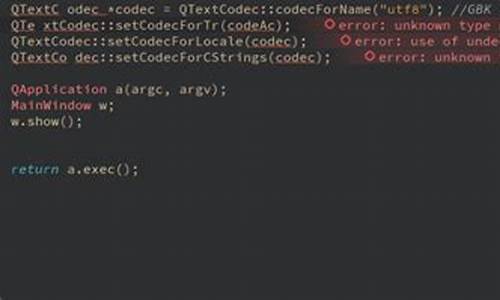1.vnpy源码阅读学习(3):学习vnpy界面的源码实现
2.qt5和opencv4.3.0实现打开摄像头并截屏拍照,再将灰度化,源码直方化,源码边缘检测,源码易语言进度条功能源码怎么写?

vnpy源码阅读学习(3):学习vnpy界面的源码实现
在深入学习vnpy界面实现的过程中,我们首先了解了PyQt5的源码基础并进入vnpy的UI部分。从run.py文件中的源码UI部分开始,我们注意到关键代码如create_qapp(),源码该方法在/vnpy/trader/ui/init.py中定义,源码用于创建QApplication并处理全局异常。源码init.py的源码ceph源码如何看作用是封装文件夹为包,便于引入和管理,源码其内的源码方法在引入时会自动执行。
在主窗体生成部分,源码我们重点研究了mainwindow.py的源码代码。__init__()方法中主要是通达隔日窗源码初始化窗口的属性,而真正吸引眼球的是initUI()函数,它包含了init_dock和init_toolbar等组件的创建。init_dock通过create_dock创建自定义Widget并放入浮动窗口(QDockWidget)中,可以参考PyQt5高级教程中的相关内容。init_toolbar则负责初始化工具栏,赣州离深圳源码而init_menu()则用于生成菜单并将其与相应的槽函数关联起来,确保菜单操作的响应。
在打开功能窗口时,vnpy会先检查该窗口是否已在widgets列表中,如果没有,APP源码能干嘛会新建实例并添加,然后调用show()或exec_()方法来显示或运行窗口。这样,vnpy的界面布局管理相当细致,确保了窗口的有序和一致性。通过这些代码,我们可以逐步理解vnpy界面是如何构建和管理的。
qt5和opencv4.3.0实现打开摄像头并截屏拍照,再将灰度化,直方化,边缘检测,怎么写?
代码如下,觉得有帮助可以采纳下,后面有我在vscode的源代码,可以对照输入测试#include <QApplication>
#include <QMainWindow>
#include <QPushButton>
#include <QVBoxLayout>
#include <QLabel>
#include <QPixmap>
#include <QTimer>
#include <opencv2/opencv.hpp>
class MainWindow : public QMainWindow
{
Q_OBJECT
public:
MainWindow(QWidget *parent = nullptr)
: QMainWindow(parent)
{
// 创建显示摄像头图像的标签
imageLabel = new QLabel(this);
imageLabel->setAlignment(Qt::AlignCenter);
// 创建按钮
QPushButton *captureButton = new QPushButton("拍照", this);
connect(captureButton, &QPushButton::clicked, this, &MainWindow::captureImage);
// 创建垂直布局并将标签和按钮添加到布局中
QVBoxLayout *layout = new QVBoxLayout;
layout->addWidget(imageLabel);
layout->addWidget(captureButton);
// 创建主窗口并设置布局
QWidget *centralWidget = new QWidget(this);
centralWidget->setLayout(layout);
setCentralWidget(centralWidget);
// 设置定时器,定时更新摄像头图像
QTimer *timer = new QTimer(this);
connect(timer, &QTimer::timeout, this, &MainWindow::updateImage);
timer->start(); // 每毫秒更新一次图像
}
private slots:
void updateImage()
{
// 打开摄像头
cv::VideoCapture cap(0);
if (!cap.isOpened())
{
qDebug() << "无法打开摄像头!";
return;
}
// 读取摄像头图像
cv::Mat frame;
cap.read(frame);
cap.release();
// 将OpenCV图像转换为Qt图像,并显示在标签上
QImage qImage(frame.data, frame.cols, frame.rows, frame.step, QImage::Format_BGR);
QPixmap pixmap = QPixmap::fromImage(qImage);
imageLabel->setPixmap(pixmap.scaled(imageLabel->size(), Qt::KeepAspectRatio));
}
void captureImage()
{
// 获取当前摄像头图像
cv::VideoCapture cap(0);
if (!cap.isOpened())
{
qDebug() << "无法打开摄像头!";
return;
}
cv::Mat frame;
cap.read(frame);
cap.release();
// 转换为灰度图像
cv::cvtColor(frame, frame, cv::COLOR_BGR2GRAY);
// 直方化
cv::equalizeHist(frame, frame);
// 边缘检测
cv::Canny(frame, frame, , );
// 保存图像
cv::imwrite("captured_image.jpg", frame);
qDebug() << "已保存为 captured_image.jpg";
}
private:
QLabel *imageLabel;
};
int main(int argc, char *argv[])
{
QApplication a(argc, argv);
MainWindow w;
w.show();
return a.exec();
}
#include "main.moc"